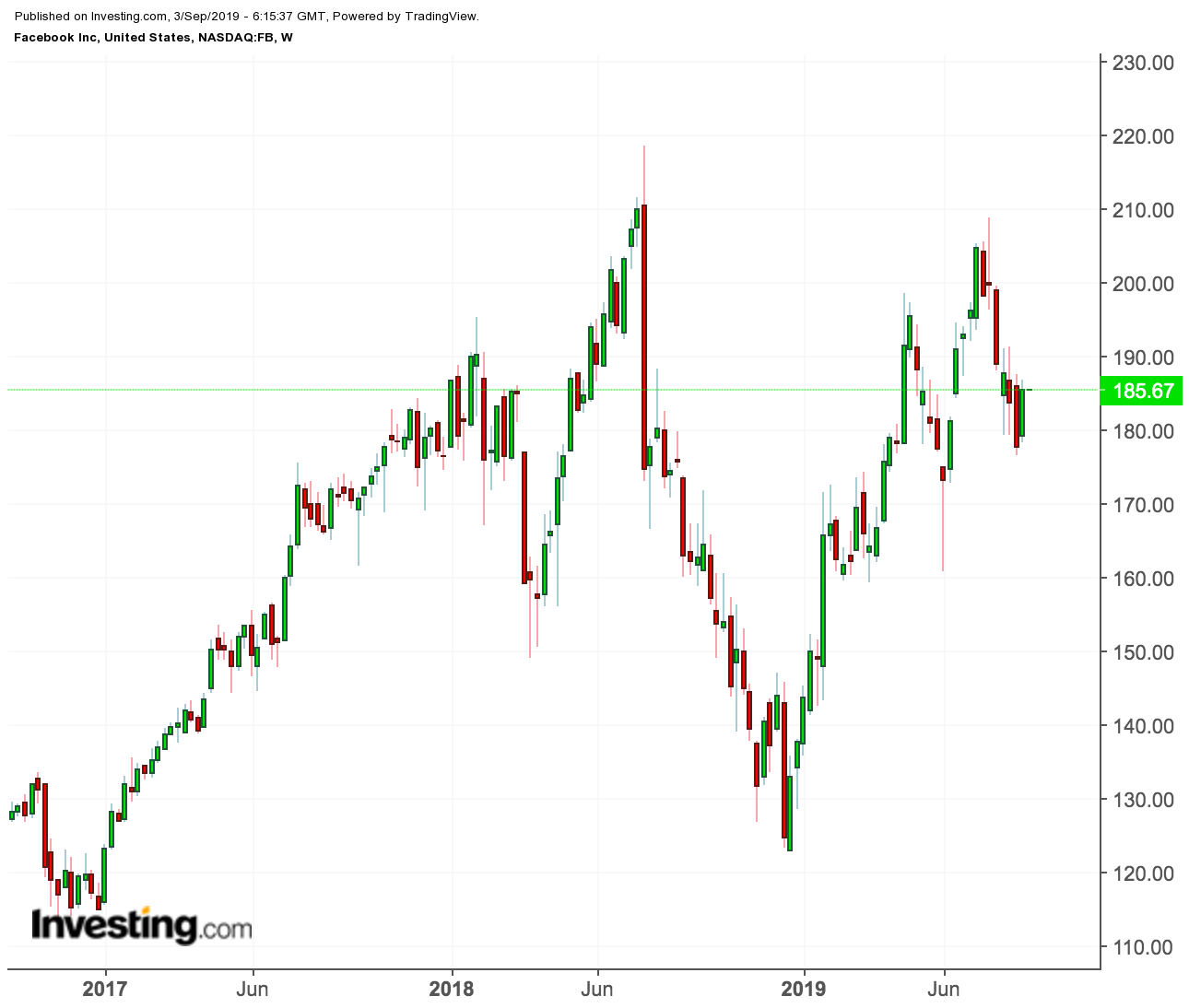Facebook (NASDAQ:FB) is leading the pack of top technology stocks, including Apple (NASDAQ:AAPL) and Netflix (NASDAQ:NFLX). The most surprising element in FB's rally is that this upward move has survived regulatory probes, fines, and general mistrust about this social media platform.
Facebook's shares have surged more than 40% this year, to close on Friday at $185.67. This strong rebound comes after a tumultuous 2018, during which the shares plunged 26%, sapping investor confidence with a variety of high-profile setbacks, including data breaches, user privacy concerns and the political manipulation of its platform.
Though its stock is still trading below 14% from the all-time high that it hit last summer, the powerful move this year defies a doomsday scenario where bears predicted a collapse in sales. For the second-quarter that ended on June 30, Facebook reported a 28% gain in sales, beating analysts’ consensus forecast.
Going forward, there is no guarantee that the challenges will go away for the world’s largest social media platform. In the latest conference call with analysts in July, the company’s chief financial officer warned that Facebook’s slowdown in revenue growth could extend beyond this year, as growing limitations on how much personal data Facebook can collect and use for ads will make it tough to make money through advertising sales.
There is no doubt that the regulatory oversight and antitrust probes will continue to pose a major challenge to social media companies’ future growth as politicians and regulators try to put together a set of rules to control and stem misuse. But when it comes to Facebook, investors are becoming more confident about CEO Mark Zuckerberg’s ability to produce market-beating returns and downplaying the company’s conservative tone.
Here are the two main reasons behind this optimism:
1. User Growth
One of the key metrics that is life and death for any social media company is its user- engagement. Over the past several quarters, there has been a clear trend emerging when it comes to Facebook’s main app. The growth in the platforms main revenue-generation regions — North America and Europe — is stagnating.
The number of daily users of the Facebook social network and the company’s Messenger app rose to 1.6 billion people in the second quarter, with a growth rate of 8% from a year ago — the second-slowest in the company’s history.
While growth at the main Facebook app has slowed, the company is still adding users quickly on other properties. A total of 2.7 billion people use at least one Facebook-owned app — Facebook, Instagram, WhatsApp or FB Messenger — every month, making its the world’s largest social network.
2. New Growth Drivers
What’s keeping investors excited about Facebook’s prospects is its ability to continue attracting ad dollars with its 2.7 billion users on different platforms. A key growth area is the company’s Stories features, which are full-screen photos and videos users can post on Facebook, Instagram, WhatsApp and Messenger.
Facebook’s move into e-commerce via its Instagram and What’sApp apps could add billions of dollars to its revenue within a few years. The Instagram photo-sharing app, which has ads in its photo feed and recently added e-commerce tools, is becoming a more significant part of the business.
To deal with a possible slowdown in its advertising business, Facebook is pushing into new areas, including payments and e-commerce. Zuckerberg said that now that Facebook users are linked to large networks of people and organizations, his next step is to help them derive value from those connections.
In June, Facebook said it is expanding its video-on-demand service, Watch, and has teamed up with global publishers to bring their content to the Watch platform. Deutsche Bank analysts believe that Watch could contribute $5 billion in revenues by 2021.
These growth initiatives are in addition to the company’s controversial cryptocurrency project, Libra, which is facing global resistance since it was announced in June. According to Facebook, the main purpose of Libra is to enable people to use and transfer money around the globe more cheaply than current options allow, and that adding Libra would be most useful in countries where banking options are scant and the home currency is volatile.
Bottom Line
After a powerful rally this year, Facebook shares are weathering the increased volatility in markets much better than other tech stocks. FB’s continued ability to drive engagement and monetization of its existing properties make its stock a solid long-term bet, despite the recent setbacks on the regulatory front.
Which stock should you buy in your very next trade?
AI computing powers are changing the stock market. Investing.com's ProPicks AI includes 6 winning stock portfolios chosen by our advanced AI. In 2024 alone, ProPicks AI identified 2 stocks that surged over 150%, 4 additional stocks that leaped over 30%, and 3 more that climbed over 25%. Which stock will be the next to soar?
Unlock ProPicks AI